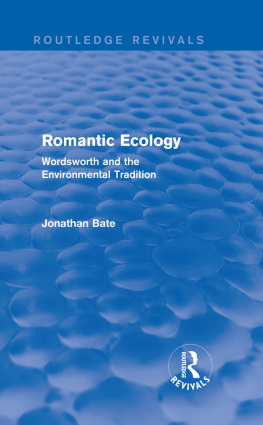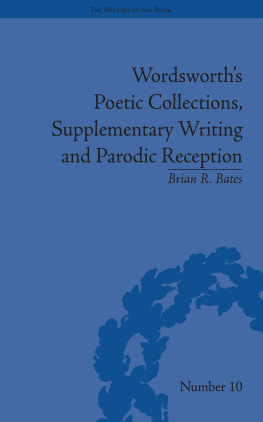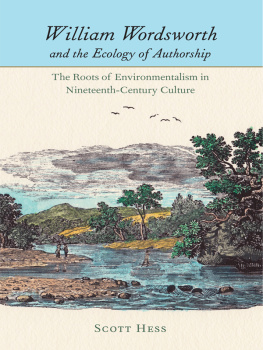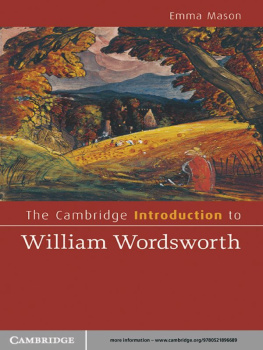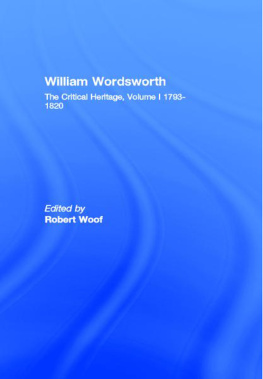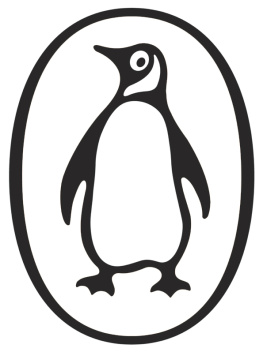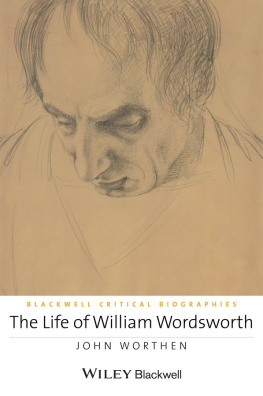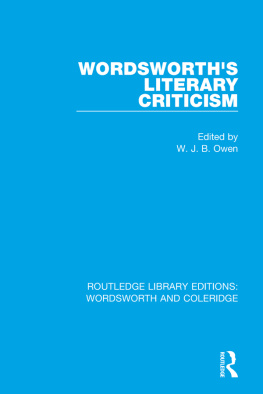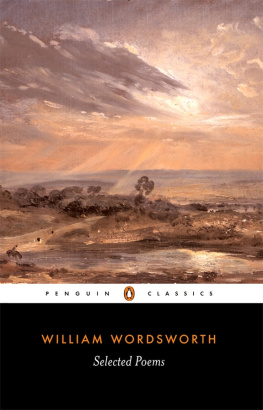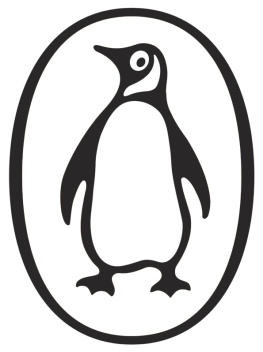Wordsworth William - Romantic ecology: Wordsworth and the environmental tradition
Here you can read online Wordsworth William - Romantic ecology: Wordsworth and the environmental tradition full text of the book (entire story) in english for free. Download pdf and epub, get meaning, cover and reviews about this ebook. City: England, year: 2013, publisher: Routledge, genre: Science. Description of the work, (preface) as well as reviews are available. Best literature library LitArk.com created for fans of good reading and offers a wide selection of genres:
Romance novel
Science fiction
Adventure
Detective
Science
History
Home and family
Prose
Art
Politics
Computer
Non-fiction
Religion
Business
Children
Humor
Choose a favorite category and find really read worthwhile books. Enjoy immersion in the world of imagination, feel the emotions of the characters or learn something new for yourself, make an fascinating discovery.
- Book:Romantic ecology: Wordsworth and the environmental tradition
- Author:
- Publisher:Routledge
- Genre:
- Year:2013
- City:England
- Rating:4 / 5
- Favourites:Add to favourites
- Your mark:
- 80
- 1
- 2
- 3
- 4
- 5
Romantic ecology: Wordsworth and the environmental tradition: summary, description and annotation
We offer to read an annotation, description, summary or preface (depends on what the author of the book "Romantic ecology: Wordsworth and the environmental tradition" wrote himself). If you haven't found the necessary information about the book — write in the comments, we will try to find it.
Romantic ecology: Wordsworth and the environmental tradition — read online for free the complete book (whole text) full work
Below is the text of the book, divided by pages. System saving the place of the last page read, allows you to conveniently read the book "Romantic ecology: Wordsworth and the environmental tradition" online for free, without having to search again every time where you left off. Put a bookmark, and you can go to the page where you finished reading at any time.
Font size:
Interval:
Bookmark:
Routledge Revivals
Romantic Ecology
First published in 1991, Romantic Ecology reassesses the poetry of William Wordsworth in the context of the abiding pastoral tradition in English Literature. Jonathan Bate explores the politics of poetry and argues that, contrary to critics who suggest that Wordsworth was a reactionary who failed to represent the harsh economic reality of his native Lake District, the poets politics were fundamentally green. As our first truly ecological poet, Wordsworth articulated a powerful and enduring vision of human integration with nature which exercised a formative influence on later conservation movements and is of immediate relevance to great environmental issues today. Challenging the orthodoxies of new historicist criticism, Jonathan Bate sets a new agenda for how Romanticism is studied.
Romantic Ecology
Wordsworth and the Environmental Tradition
Jonathan Bate

First published in 1991
by Routledge
This edition first published in 2013 by Routledge
2 Park Square, Milton Park, Abingdon, Oxon, OX14 4RN
Simultaneously published in the USA and Canada
by Routledge
711 Third Avenue, New York, NY 10017
Routledge is an imprint of the Taylor & Francis Group, an informa business
1991 Jonathan Bate
All rights reserved. No part of this book may be reprinted or reproduced or utilised in any form or by any electronic, mechanical, or other means, now known or hereafter invented, including photocopying and recording, or in any information storage or retrieval system, without permission in writing from the publishers.
Publishers Note
The publisher has gone to great lengths to ensure the quality of this reprint but points out that some imperfections in the original copies may be apparent.
Disclaimer
The publisher has made every effort to trace copyright holders and welcomes correspondence from those they have been unable to contact.
A Library of Congress record exists under ISBN: 90024527
ISBN 13: 978-0-415-85659-1 (hbk)
ISBN 13: 978-0-203-79884-3 (ebk)
ROMANTIC ECOLOGY
Wordsworth and the Environmental Tradition
Jonathan Bate

First published 1991
by Routledge
11 New Fetter Lane, London EC4P 4EE
Simultaneously published in the USA and Canada
by Routledge
a division of Routledge, Chapman and Hall, Inc.
29 West 35th Street, New York, NY 10001
1991 Jonathan Bate
Typeset in 10/12pt Bembo by
Witwell Ltd, Southport
Printed in Great Britain by
Clays Ltd, St Ives plc
All rights reserved. No part of this book may be reprinted or reproduced or utilized in any form or by any electronic, mechanical, or other means, now known or hereafter invented, including photocopying and recording, or in any information storage or retrieval system, without permission in writing from the publishers.
British Library Cataloguing in Publication Data
Bate, Jonathan
Romantic ecology: Wordsworth and the environmental tradition.
1. Poetry in English. Wordsworth, William, 17701850
I. Title
821.7
Library of Congress Cataloging in Publication Data
Bate, Jonathan.
Romantic ecology: Wordsworth and the environmental tradition/Jonathan Bate.
p. cm.
Includes index.
1. Wordsworth, William, 17701850 Knowledge Natural history.
2. Wordsworth, William, 17701850 Political and social views.
3. Environmental policy Great Britain History 19th century.
4. Pastoral poetry, English History and criticism.
5. Environmental policy in literature. 6. Ecology in literature.
7. Nature in literature. 8. Romanticism England. I. Title.
PR5892.N2B38 1991
821.7 dc20 90-24527
ISBN 0 415 06115 6 (hbk)
ISBN 0 415 06116 4 (pbk)
For participants past and future in the Wordsworth Summer Conference and Wordsworth Winter School at Grasmere, in whose spirit of dialogue between professional critic and common reader, and with whose sense of the relationship between poetry and place, this book is written.
CONTENTS
I am most grateful to John Kerrigan, Hilary Gaskin, and Glen Cavaliero for their reading of the typescript and to Nicholas Roe, Alan Liu, Ludmilla Jordanova, and Alun David for comments on drafts of individual chapters. This books approach to Wordsworth owes a debt to Terry McCormick, but neither he nor anyone other than myself is responsible for its weaknesses. For invitations which gave me the opportunity to try out some of my ideas in the form of lectures, I would like to thank Richard Wordsworth of Grasmere, Jay Fox of Brigham Young University (who also published a version of the lecture), and the Interdisciplinary Group for Historical Literary Studies of Texas A & M University. An earlier version of about half of appeared in Essays in Criticism, and a few sentences of the same chapter in The Cambridge Review; I am grateful to the editors of these publications for permission to revise and reprint this material. Jane Armstrong at Routledge encouraged the project from an early stage.
J. B.
Trinity Hall, Cambridge
All England may, if it so chooses, become one manufacturing town; and Englishmen, sacrificing themselves to the good of general humanity, may live diminished lives in the midst of noise, of darkness, and of deadly exhalation. But the world cannot become a factory nor a mine. No amount of ingenuity will ever make iron digestible by the million, nor substitute hydrogen for wine. Neither the avarice nor the rage of men will ever feed them.
No air is sweet that is silent; it is only sweet when full of low currents of under sound triplets of birds, and murmur and chirp of insects. As the art of life is learned, it will be found at last that all lovely things are also necessary; the wild flower by the wayside, as well as the tended corn; and the wild birds and creatures of the forest, as well as the tended cattle; because man doth not live by bread only.
John Ruskin, Unto This Last (1862)
The air pollution, more than the existence of the Iron Curtain, brought about the revolution in Czechoslovakia.
(Lubo Beniak, Mlad Svt, Prague, December 1989)
Literary criticism has never been a pure discipline. Ever since Plato and Aristotle argued over whether poets are harmful or beneficial to the state, political and moral concerns have borne in upon the discussion of literature. Inevitably and properly this will be the case so long as poetry continues to have any effect on how we understand ourselves, how we think about the ways in which we live our lives. As political and moral visions change, so literary criticism will change too. I began writing this introduction on a fairly typical day early in 1990 when the three leading stories on the evening television news were: the Central Committee of the Communist Party of the Soviet Union voted to abolish article six of the constitution, thus bringing to an end the formal guarantee of the Partys sole right to power; the announcement of a move towards a unified German currency; and the appearance of a scientific report supporting the hypothesis that there are links between freak weather conditions and global warming.
1989 was more of an 1848 than a 1789, but it may well take its place in history beside the original revolutionary year as a moment when an old order finally died. One could well imagine a citizen of Czechoslovakia who had seen the Prague Spring of 1968 nipped in the bud finding in the events of 1989 the shoots / And hopeful blossoms of a second spring. The phrase is Wordsworths. He used it when he opened the eleventh book of the 1850 text of his autobiographical epic,
Next pageFont size:
Interval:
Bookmark:
Similar books «Romantic ecology: Wordsworth and the environmental tradition»
Look at similar books to Romantic ecology: Wordsworth and the environmental tradition. We have selected literature similar in name and meaning in the hope of providing readers with more options to find new, interesting, not yet read works.
Discussion, reviews of the book Romantic ecology: Wordsworth and the environmental tradition and just readers' own opinions. Leave your comments, write what you think about the work, its meaning or the main characters. Specify what exactly you liked and what you didn't like, and why you think so.

